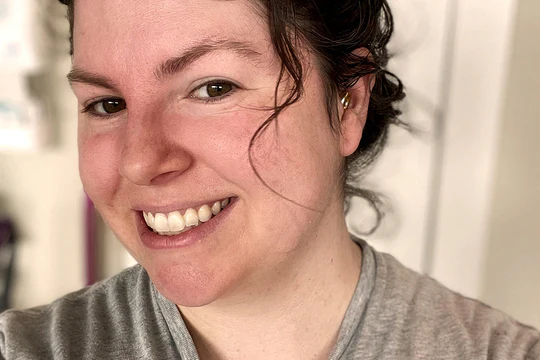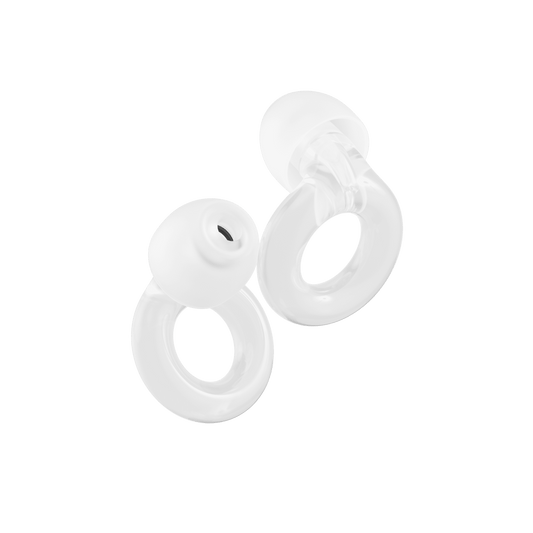Frazzled brain. Check.
Unidentifiable substance on T-shirt. Check.
Spongebob Squarepants blaring in the background. Check.
And to top it all off, you’ve got a piece of toast hanging from your hair.
It’s finally happened. You’ve become a poster child for the overwhelmed, stressed-out, overstimulated parent.
And the truth is, your brain is struggling to cope.
Parenting: It’s a challenge that puts every shred of patience and brainpower to the test. Through all the sleepless nights, never-ending tantrums, and zero chance for self-care, you’re also running on pure caffeine and adrenaline – it’s no wonder that you feel like a big ball of stress most of the time.
And when you combine all of that with having to remember the million and one tasks you have to do that day, your brain can go into overload.
The thing is, while all parents can feel overwhelmed at times, the stress you’re experiencing may be a result of sensory overload. It’s no big surprise, right? As a parent the noise levels you experience are constant – from wake-up through to bedtime (and sometimes throughout the night!).
And when sensory overload occurs, it’s easy to second-guess yourself. What’s wrong with me? Why am I not coping? Maybe I’m not cut out to be a parent after all…
Time to stop being hard on yourself. The world is becoming increasingly fast-paced, with added noise and pressures that are enough for any parent to experience sensory overload – let alone if you find yourself living with noise sensitivity.
In this blog post we’re going to take an up-close look at parent sensory overload. What it is, how to recognize it, and most importantly how to manage overstimulation.
Here we go.
What is sensory overload?
As a parent, it’s a default move to always blame yourself.
“I don’t have enough patience.”
“I’m not giving the kids what they need.”
“I wish I was more like [enter other parent name here].”
But the truth is that every parent goes through overwhelm and a large number experience sensory overload at some point during their parenting journey (take a look at this real-life testimonial from a noise sensitive parent).
Do you ever feel like you’re easily stimulated by the world around you? You might find that lights are too bright, smells are super strong, noises are too grating, and social interactions are a struggle.
If this is the case, chances are that you have sensory processing disorder with a high sensitivity to stimuli in your environment. This means that your nervous system struggles to cope with the physical and emotional subtleties around you.
And when you find yourself desperately trying to navigate those feelings of constant overstimulation, you’re at risk of exploding, breaking down, or suffering from burnout.
The scienc-y bit
Simply put, sensory overload happens when your brain is getting more input from your senses than it can cope with. For some, it feels like their brain is “stuck” and they can’t focus or prioritize things.
When you’re in sensory overload your brain isn’t using its higher centers of reasoning and emotional regulation. It’s very focused on keeping you safe. So then your body releases stress hormones and the blood flow into your brain moves to the primitive or lower centers.
Your brain is crying out to you saying: “I need this situation to change. And fast!”
Because of sensory stimulation overloading your nervous system, you go into a constant state of fight-or-flight response mode. And constant exposure to this can make people feel desolate and angry, and eventually lead to feelings of depression and anxiety.
Types of overstimulation as a parent
Every single thing that we process is filtered through our sensory system by a process called “sensory processing.” This is the way that the body receives information from the environment and then responds in the appropriate way.
Our reactions may be emotional or physical, but it all starts with our senses. For example, if you try to eat food that’s too hot, your response could be to open your mouth.
We all know about the five senses, but there are in fact eight:
- Tactile (touch)
- Olfactory (smell)
- Auditory (hearing)
- Visual (seeing)
- Gustatory (taste)
- Vestibular (sense of head movement)
- Proprioceptive (sensations from muscles and joints)
- Interoceptive (sensations from internal organs)
And when it comes to our sensory makeup, we’re all individuals. For example, some people concentrate better with music playing in the background, whilst some need complete silence to be productive. Some love the feeling of sand on their skin, whilst others find it unbearable.
Each human brain has a certain amount of tolerance for each sensation, which is known as our neurological threshold. So each and every one of our sensory thresholds is different for different senses, which is why some people may be more sensitive to light than sound, for example.
As parents, there are a number of different types of overstimulation that can overwhelm any parent, and odds are you are usually experiencing at least one, if not all of these on a daily basis.
Collapsible content
Constant stimulation
It’s constant. All day, every day. And if you happen to have a crying baby or a child who won’t sleep, then there’s no respite at night either. This around-the-clock impact on the senses can cause intense stress for some people.
Body stimulation
Physical feelings inside the body can also contribute to overstimulation as a parent. Your body is exhausted. You’re hungry and never quite getting around to feeding yourself. Or you’re feeling anxious for long periods of time. All of these things can cause you to become overstimulated.
Stimulation from your “inner critic”
When you’re feeling super anxious you might find your brain starts working overtime. Cue the thoughts and feelings of self-doubt, endless questioning of your parenting, constant worrying about the future, etc.
Stimulation from other people
We have all that well-meaning aunt/grandma/third cousin who just can’t read the room. You’ve had two hours sleep and the kitchen looks like a hurricane passed through it. The last thing you want to do is host. But five hours later, they’re still there giving you their thoughts on why your baby isn’t sleeping.
Parents have different triggers
There is no one size fits all where sensory overload is concerned. Some things can be more triggering for some than for others.
Some common causes of overstimulation in parents can include:
- Dealing with different needs all at the same time
- Internal noise of the mental load
- Constant moving, running, and jumping
- A messy house
- Exhaustion
- Random high-pitched screams or shouting
- Whining
- Constantly being touched
- Loud toys
- Burnout from multitasking
Where parenting noise triggers are concerned, the list is endless. But the point is that the potential triggers are many and often something that’s a trigger for one person will not be for someone else.
Signs that you’re overstimulated
When the sensory information that our brain is processing becomes too much for our brain to handle, we move into a state of overload.
And chances are you go through the course of your day struggling to cope with your emotions.
The symptoms could be:
- Extreme irritability, anger, or meltdowns
- Trouble keeping focus
- An irresistible urge to close your eyes or block your ears
- A strong urge to escape
- Intense feelings of being “wound up” and unable to regain a sense of calm
- Becoming uncoordinated or off balance

Tips for managing sensory overload
The good thing is that with the right approach, sensory overload can be managed. Because at times it’s unavoidable and all part of the crazy, wonderful parenting journey.
They make noise and spill stuff (a LOT of stuff). They cry and they laugh. They’re developing into little beings, and they need you. It’s all about trying to find a way to protect your brain amongst the chaos and allowing yourself the freedom to enjoy their childhood without feeling overwhelmed.
Here’s how to deal with overstimulation as a parent.
1. Know your triggers
As everyone is triggered by different things, it’s a good idea to get to know what is most triggering for you. By learning to recognize the warning signs you can get a head start on getting overload under control.
Maybe it’s loud TV noise that sends your stress levels through the roof. So why not move the TV into a designated room that you can sit separately away from? Or if it’s bright lights that you find are triggering, then use smaller side lamps and give yourself frequent breaks in a darkened room.
So the next time you’re facing sensory overload, ask yourself the question: “If I could change one thing about this situation, what would it be?”
By being able to identify patterns you’ll be able to get a better understanding of what sparks these intense feelings. And do something about it.
2. Invest in noise-reducing earplugs
When you consider that the sound of a baby crying can reach 120 dB (close to the noise intensity of a departing plane), it’s no surprise that sensory overwhelm is always looming.
Noise-reducing earplugs can really help to deal with sensory overload as a parent. Earplugs such as Loop Engage and Loop Engage Plus. These modern earplugs are especially designed to limit the volume of parenting, while making sure that you don’t miss a beat.
Loop Engage are earplugs that take the edge off parenting life by reducing noise levels by up to 16 decibels. With a patented acoustic channel and a newly engineered filter, they’re 100% safe to wear while looking after children. You’ll still be able to hear everything, just with a bit more calm.
They’re also ultra-comfortable and flexible, and fit into all types of ears.
If you’re looking for a higher level of noise reduction, Loop Engage Plus sound like the earplugs for you. They’re perfect for reducing the noise while still hearing everything crystal-clear, allowing you to focus on remaining present and calm.
3. Get into a routine
When it comes to parenting, predictability is a winner.
If your routine is constantly changing, it doesn’t allow for the time and planning you need to manage a situation where potential sensory overload can come into play.
So find a routine that works for you, and stick to it. You’ll be amazed at the effect it has on your sensory well-being.
10M+ happy customers
Our noise-reducing earplugs
4. Schedule alone time
Repeat to yourself: You are not a bad parent for feeling overwhelmed. We all need peace and breathing space. In actual fact it makes us more tolerant, more patient, and generally happier all round.
So schedule in some time for you. That’s right – you over there. Even if it’s just in another room with a closed door. Make it a non-negotiable. It’ll become something to look forward to and a breather from the difficult day you’ve had.
Make sure that everyone knows that’s your time and you’re not to be disturbed.
5. Be an early riser
OK, so if your child doesn’t sleep through the night, this just isn’t realistic. But if you find yourself waking up earlier than everyone else, a bit of alone time can often work wonders at the start of the day.
Just think: coffee in hand. Breakfast you don’t have to share. And your choice of TV. Heaven.
6. Introduce “quiet time” into the mix
While this may seem like you’re hoping to achieve the impossible, introducing the concept of quiet time is hugely effective (if not necessary).
Here’s how to do it:
- Have a think about some quiet activities and games that your child would enjoy.
- Practice scheduled quiet time as a family.
- Combine quiet time with a suitable atmosphere, such as dimming the lights.
- Offer some screen time (the iPad is your best friend) to give yourself a break.
- Ban noisy toys. Wave goodbye to the recorder or the dance mat for an hour.
7. Set boundaries for yourself
I have to clean the kitchen. There’re piles of laundry to be folded. The oven needs to be cleaned. As a parent, there’s always a million and one things on your to-do list. But the thing is, “pushing through” is not always the best way.
STOP. The house will not fall apart – but you might. If you find yourself nearing your wit’s end, nothing is more important than putting your sense of calm above everything else.
So create boundaries for yourself and don’t overcommit. You’re only one person. You’ll thank yourself in the long run.
8. Get sleep
There’s no doubt about it – sleep deprivation can be a major factor in bringing on sensory overload. Especially when we’re feeling stressed on top of exhausted. Without enough rest our brains default to our more primitive senses and reactions.
But we know that it’s easier said than done. A full night’s sleep is often the holy grail. So don’t be afraid or feel bad about taking naps and leaving the housework until a later time.
Here’s some tips for getting a good night’s sleep.
- Be consistent with sleep time every day.
- Create a nice sleeping environment – dark and cool, quiet, etc.
- Skip screen time before bed.
- Avoid large meals, caffeine, and alcohol before bedtime.
- Increase your physical activity throughout the day.
9. Get out and about
Getting out in nature can massively reduce your stress levels. It’s something that’s been proven time and time again. It makes us happier, less tired and can increase our attention spans, etc.
It also keeps the kids busy. So, get out there and connect with nature, take a walk, trip to the playground, or even a little play out in the garden.
Key takeaways
- Sensory overload is something that many parents will experience.
- It’s when your brain is getting more input from your senses than it can cope with.
- There are many different triggers for different people.
- You can manage your sensory overload by using the different techniques and tips available, such as scheduling quiet time or making sure that you have a routine that works for you.
- Noise can be overly stimulating. By investing in noise-reducing earplugs, you can reduce the noise level of day-to-day parenting, whilst still being able to hear all the important stuff.

What To Look For In Noise Reduction Earplugs
Unlock expert tips for choosing the perfect noise-reduction earplugs! Discover key features to consider when choosing...

Sensory overload and kids during COVID - testimonial
COVID-19 has us all locked up inside, combining parenting, relation and work with little distraction. Sensory overloa...

How To Deal With A Crying Baby
Discover effective strategies to soothe a crying baby, ensuring their comfort while maintaining your calm. Essential ...



















